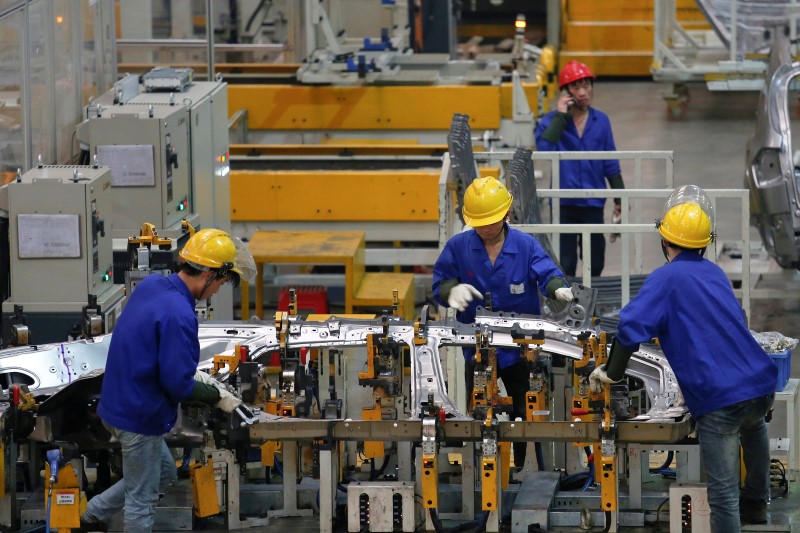By Kevin Yao and Elias Glenn
BEIJING (Reuters) - Growth in China's fixed-asset investment slipped below 10 percent for the first time since 2000 in January-May as a boost from record credit growth seemed to be quickly fading, putting expectations of further stimulus back on the table.
Analysts say a sharp deceleration in private investment could jeopardise China's growth target of 6.5-7 percent this year unless the government pumps even more money into the economy, despite growing global fears that the country is already amassing too much debt.
The International Monetary Fund was the latest to voice such concerns at the weekend, saying Beijing must act quickly to tackle mounting corporate debt which it estimates has swelled to about 145 percent of gross domestic product.
A further increase in debt levels could handicap China's long-term economic growth, David Lipton, first deputy managing director of the IMF, said on Saturday.Data on Monday showed fixed-asset investment growth - a key driver of China's economy - cooled to 9.6 percent in January-May from a year earlier, missing expectations of 10.5 percent.
Even more worrying, investment by private firms slowed to a record low, with growth cooling to 3.9 percent from 5.2 percent in Jan-April and double-digits last year. Private investment accounts for about 60 percent of overall investment in China.
Flagging private investment suggests that more and more of China's growth is dependant on government spending channelled through bloated and inefficient state enterprises, which Beijing has publicly pledged to streamline and reform. Investment by state firms rose 23.3 percent in Jan-May.
It also means authorities may have to take stronger measures to support the economy if they continue to stick to their 2016 growth target, which officials reaffirmed on Monday despite generally weak April and May data.
Indeed, other data on Monday showed that Beijing may already be doubling down on its stimulus bet, as government spending soared 17.6 percent in May on-year, versus 4.5 percent in April. Announcements of big new infrastructure projects seem to come almost daily.
"The government is trying to decelerate a bit on credit growth, but there is no point at this moment because it will have an impact on the growth outlook. Growth is still more important than anything else in China," said Zhou Hao, senior Asia emerging market economist at Commerzbank (DE:CBKG).
The soft May data also prompted some analysts to underline the possibility of more imminent policy easing by China's central bank, after some had scaled back such expectations following upbeat indicators in March.
"I see rising odds of a cut in RRR (banks' reserve requirements) or even a policy (interest) rate cut, before the end of the second quarter," Zhou said.
Global investors are also cooling on China, fearing growth may be weaker than official data suggest and citing increasing signs of protectionism. Foreign direct investment fell 1 percent in May on-year, the first drop since December.
German Chancellor Angela Merkel, on a visit to Beijing, stressed the need for a level playing field for foreign firms amid growing pressure from industry to confront China more forcefully.
CONFLICTING SIGNALS
Chinese policymakers have vowed repeatedly this year to take steps to support private firms and investment, but analysts see little progress.
"The most important factor (for private firms) is the outlook for global demand and China's economy," said Zhou.
"There is no linkage between the two (government pledges and private company actions). There's a mismatch between the government and the market. I don't see it turning around."
China needs to open up its state sector further in order to arrest the steep slowdown in private investment, statistics department spokesman Sheng Laiyun told a news conference, adding that falling prices and industrial overcapacity have impacted private investment.
Officials also took pains to say the government was committed to cutting overcapacity, especially in "old economy" heavy industries such as steel and coal.
They said nearly 5.8 million new jobs were created in the first five months of the year, bucking both official and private activity surveys which showed companies continue to shed staff.
To be sure, investment in the mining sector did fall 16.4 percent, suggesting the government's goal of rebalancing the economy away from heavy industry may still be intact.
But other May data has also been mixed, suggesting that while the economy may be bottoming out and less at risk of a hard landing, it is still struggling for traction.
Factory output grew 6 percent in May from a year earlier, the same as in April and marginally better than expected.
Analysts believe industrial output has been supported by the government's infrastructure spending spree and a recovery in the property market, though growth in that sector slowed, too.
Despite strong car sales, consumption also softened slightly, with retail sales growth easing to 10.0 percent.
Trade data last week showed a further drop in exports but the smallest decline in imports in more than a year, suggesting domestic demand was picking up.
